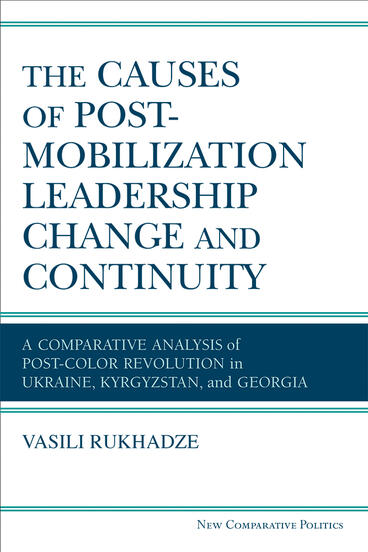The Causes of Post-Mobilization Leadership Change and Continuity
A Comparative Analysis of Post-Color Revolution in Ukraine, Kyrgyzstan, and Georgia
Large, fragmented coalitions disintegrate
Description
Vasili Rukhadze examines the factors that contributed to post-uprising leadership durability in the Ukraine, Kyrgyzstan, and Georgia in 2004–12, after these countries underwent their so-called “Color Revolutions.” Using structured, focused comparison and process tracing, he argues that the key independent variable influencing post-mobilization leadership durability is ruling coalition size and cohesion. He demonstrates that if the ruling coalitions are large and fragmented, as in the Ukraine and Kyrgyzstan, the coalitions disintegrate, thus facilitating the downfall of the governments. Alternatively, if the ruling coalition is small and cohesive, as in Georgia, the coalition maintains unity, hence helping the government to stay in power.
This study advances the debate on regime changes. By drawing a clear distinction between political leaderships that come to power as a result of popular uprisings and governments that take power through normal democratic processes, military coup, or any other means, the research offers one of the first studies on post-mobilization leadership. Rukhadze helps scholars differentiate between the factors that affect durability of post-uprising leadership from those factors that impact durability of all other political leadership, in turn equipping researchers with new tools to study power politics.
Vasili Rukhadze is Visiting Lecturer of Political Science at the University of Pittsburgh
Reviews
“This book is one of the first to compare the color revolutions in Eurasia in systematic fashion and makes a convincing case that the size and cohesion of the coalition ultimately determine the fate of the revolution in Ukraine, Kyrgyzstan, and Georgia. The empirical contribution is strong, providing one of the new data to compare the color revolutions in systematic fashion. With the Belarussian protests currently underway and possible rumblings of discontent in Russia itself, the book makes a valuable contribution to our understanding of protest and politics in electoral autocracies.”
- Richard Arnold, Muskingum University
—Richard Arnold, Muskingum University
“Vasili Rukhadze’s important new book picks up where most other studies of revolution end, demonstrating that an uprising’s organization crucially impacts its leaders’ potential to hold power long enough to effect real change if victorious. With clear and engaging prose, it will be a rewarding read for anyone interested in revolution generally or post-Soviet politics specifically.”
- Henry Hale, George Washington University
—Henry Hale, George Washington University
“A rigorous comparison of three multifaceted cases, this book traces the impact of the ‘color revolutions’ long beyond the days when they were grabbing headlines. Rukhadze’s analysis of their different paths illuminates crucial causes of the (in)stability of regimes emerging from popular uprisings.”
- Andrew Barnes
—Andrew Barnes, Kent State University

